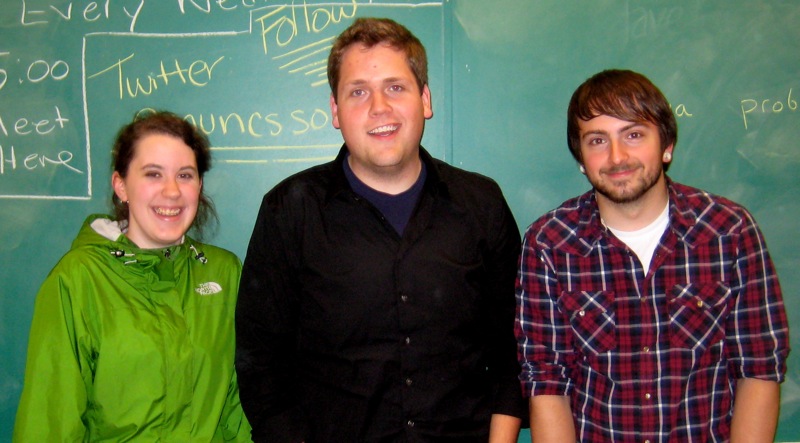Happy 1 << 5 years!:
To kick off the year the Department of Computer Science at Memorial University of Newfoundland celebrated its 32 years. Staff, students, and friends all gathered at the campus bar Bitters for a scoff, share a few yarns, and single malt scotch. Good times were had by all.
Paper Published:
This was a long time in the making, my thesis was published in Springer Communications in Computer and Information Science under the publication for "Biomedical Engineering Systems and Technologies, Third International Joint Conference, BIOSTEC 2010, Valencia, Spain, January 20-23, 2010, Revised Selected Papers". Since then several students at my alma mater have continued on the project, adding new features, exploring aspects of the design.
The Winter CS Games:
Each winter semester at the Department of Computer Science of Memorial University of Newfoundland we hold a pair of programming competitions following ACM rules. One competition sets individual programmers on three algorithm challenges, with the top three scoring competitors being awarded a small prize. The second competition is for groups of two competitors, again with three algorithm challenges with corresponding prizes. I really enjoyed this series of games as we had a record number of competitors register for the competitions, and some really great prizes to hand out to the students.
 |  |  |
 |  |  |
Security B-Sides Conference St John's 2011:
About midway through the year the Security B-Sides conference St John's NL event was held. This event brought together near 140 security experts, industry professionals and others in their community to directly connect, share ideas, insights, and develop long lasting relationships while discussing some of the major IT security related topics pressing in today's environments.
 |  |  |
Each fall semester at the Department of Computer Science of Memorial University of Newfoundland we hold a pair of programming competitions following ACM rules. One competition is for groups of three competitors, in which the teams must solve three algorithm challenges. The highest scoring team moves on to the next round of the larger ACM games. The second competition sets individual programmers on three algorithm challenges, again with the top three scoring competitors being awarded a small prize.
The fall games had record attendance, straining our ability to handle so much interest from students. I really hope the trend continues into 2012.
 |  |  |
 |  |  |
Mentoring Apache Development:
As my blog's tittle suggests, I'm developing Open Source development here in Newfoundland. There really isn't a very large software development community around here, so if you want to talk about technologies, methodologies, and related practices you have to actively seek out others to share your interests. Luckily I have another active Apache Developer in town, but it's nice to expand the community.
To that end I've taken on another local developer and have started to help them become aquatinted with the Apache Way, starting with a focus on Apache Incubator Kalumet.
IGDA-NL Chapter:
The International Game Developer Association Newfoundland Chapter started up in ernest this past fall. I've been trying to help this group gain traction by getting the word out about their meetings and helping to bring attention to the accomplishments of some of their members. Earlier in the year I managed to arrange a few moments to talk with Celsius Studios and Binary Dawn about their experiences here in Newfoundland, these conversations can be viewed at Techvibes: Binary Dawn on WordUs2, and Celsius Studios on Red Nova.
Guest Lecturing:
I had two opportunities in 2011 to provide talks to CS 3716 Software Methodologies classes at Memorial University. Both experiences were fun, I focussed on various subjects including a brief introduction to the Apache Way, the projects I've worked on, my views on technology (locally grown and in general), and project management (specifically talking about Apache Karaf).
Apache Karaf Releases:
Over the past year I've had the honor to head up the release efforts for ten Apache Karaf releases. During these events I'd make mention of my wine and music selection to accompany the release process. For those of you interested in taking a tastefully musical review of our past years' releases I have put together the below table:
So what do I see for 2012?
Good question!
For Apache Karaf I see...
- The highly anticipated Apache Karaf 3.0.0 release should come to reality :)
- Releases of Apache Karaf's new sub projects.
- Apache Karaf 2.2.x and 3.0.x patch releases should come out on a regular basis.
- New Apache Karaf 2.3.x and 3.1.x branches may make their appearances.
- Continued CS Games in the Winter and Fall 2012 semesters.
- Growth of the IGDA-NL Chapter (more meetings and events).
- More speaking opportunities at Mun CS Department via their Departmental Seminars and Guest Lecturing.
I know nothing earth shaking is listed above, but in context the above represents a lot of efforts, community growth, and optimism for the future :)
Before I end this rambling post, I'd like to share the below video for Bandages by Hey Rosetta! It's my favorite song by local talent for 2011, and its' video features many beautiful scenes of Newfoundland. While enjoying the music I'm opening a bottle of Auk Island Winery's Nautica (Blueberry Shiraz).
Before I end this rambling post, I'd like to share the below video for Bandages by Hey Rosetta! It's my favorite song by local talent for 2011, and its' video features many beautiful scenes of Newfoundland. While enjoying the music I'm opening a bottle of Auk Island Winery's Nautica (Blueberry Shiraz).
Music, Wine, Community, and Open Source Software Development in Newfoundland - 2011 was great, here's to 2012 :)

































